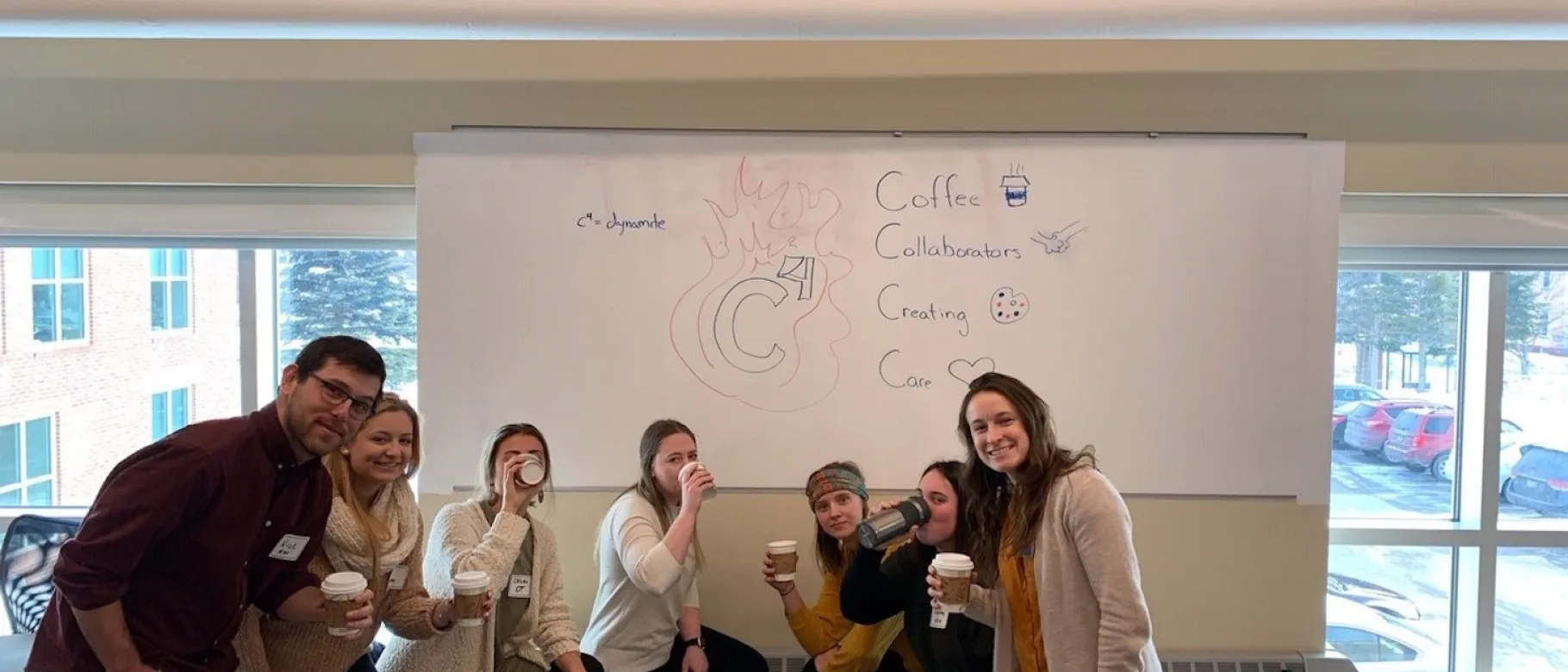Annual interprofessional student poster session gets virtual treatment

Although not in as glamorous or dramatic a setting as the Eleanor deWolfe Ludcke Auditorium, the University of New England’s Center for Excellence in Collaborative Education (CECE) still managed to hold its annual student poster session on Wednesday, May 6 — it was just by video stream, instead.
The poster session was held to share the research and scholarship of student teams who participated in interprofessional team immersions, student-led mini-grants, clinical experience, and event-related and service-learning community projects.
The event, normally a socially active time of learning, discussion, and collaboration, was held digitally due to the ongoing coronavirus pandemic. To convert the event into a digital format, students submitted videos presenting their projects, which were then stitched together and displayed on the UNE website and on Facebook Live.
The CECE serves as a University-wide hub for cross-disciplinary education and collaborative practices across academic disciplines. This year’s annual poster session saw 22 student teams use interprofessional approaches to examine patient-centered care, a hallmark of UNE’s approach to clinical education.
In addition, more than 80 students were announced to have received the CECE Interprofessional Education Honors upon their graduation this spring. To have earned the distinction, students must have attended three or more CECE events and written reflections about them, participated in an interprofessional project and presentation, and completed a portfolio documenting their experiences.
“We were excited and proud to have received so many excellent posters for our virtual session,” said CECE Program Manager Kris Hall. “The interprofessional team immersion student posters demonstrate the importance of patient-centered care, and each team described how they worked toward that goal.”
For the students — while maybe not as personal as they would have hoped — the digital event was a chance to showcase the research they pored over throughout the spring semester.
“It felt really nice to put our work out there for everyone else to see, and it was also really important to see what the other groups had done because what we took away from the experience wasn’t necessarily what other groups took from it,” said Jessica Stewart (M.S.P.A., ’21), of Gorham, New Hampshire.
Stewart’s group, dubbed the “Coffee Collaborators Creating Care,” was composed of students from the Westbrook College of Health Professions (WCHP) and Colleges of Osteopathic Medicine, Dental Medicine, and Pharmacy.
As part of their interprofessional team immersion, the group met with a simulated patient named Alex, whose chief complaint was dental pain. Working together using an interdisciplinary approach, the students further learned that Alex was homeless, unemployed, and had a hard time finding transportation to and from appointments — all factors that could impact the type of care he would need.
“Because we approached Alex’s treatment through an interprofessional lens, we learned that dental pain wasn’t the only problem; but rather, it was part of many problems,” said Stewart. “It was good to see what Alex’s needs were and to work with each other to figure out the best plan of care for the patient.”
Other members of the team were Janet Laverich (D.O., ’22), Lea Martin (Pharm.D., ’22), Casey Imelio (M.S.O.T., ’20), Katherine Buscemi (Dental Hygiene, ’21), Cammy Macomber (Nursing, ’21), and Nicholas Shellenberger, M.S.W. ’20.
Faculty mentors for the project were David Prichard, Ph.D., LCPC, LADC, professor in the School of Social Work, and Carol Lambdin-Pattavina, OTD/OTRL, assistant professor of Occupational Therapy.
The experience taught the student team that health care does not have a one-size-fits-all approach and that collaboration across medical disciplines is critical in determining the appropriate level of care for a patient.
“The best way to care for a patient is to have every possible kind of health professional working for the patient, but that is hard when you don’t completely understand what each profession or its specialty branches does,” Stewart said. “It was nice to really learn about the differentiations between disciplines and learning that, if I had to refer a patient to a different specialty, which one would be the best one.”
Hall praised the Coffee Collaborators’ efforts and approach to interprofessional collaboration.
“The group did a great job in describing the benefits of learning about each other’s roles and responsibilities, specifically an increased confidence in providing care as a team for a complex patient,” she said.